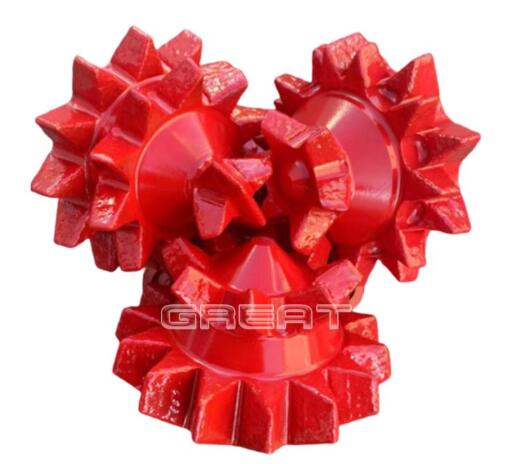Milled tooth bits and insert bits are two types of rotary drill bits used for drilling through hard rock formations. While both types of bits are designed to accomplish the same task, there are significant differences between them in terms of design, construction, and performance.
Milled tooth bits, also known as mill tooth bits, consist of a steel body with hardened steel teeth or milled-tooth inserts embedded in the bit's cone. These teeth are designed to scrape and grind through rock formations, creating a borehole. The size and shape of the teeth vary depending on the type of rock formation being drilled. Milled tooth bits are typically less expensive than other types of drill bits, making them an attractive option for drilling operations on a budget. They are also versatile and can be used to drill through a wide range of rock formations.
Insert bits, also known as tungsten carbide insert (TCI) bits, consist of a steel body with tungsten carbide inserts or buttons embedded in the bit's cone. These inserts are designed to cut through rock formations by shearing them. The size and shape of the inserts vary depending on the type of rock formation being drilled. Insert bits are more expensive than milled tooth bits but are generally more durable and efficient. They are also more effective in drilling through hard and abrasive rock formations.

Here are some of the key differences between milled tooth bits and insert bits:
Cutting structure: The cutting structure of milled tooth bits consists of steel teeth or milled-tooth inserts, while insert bits have tungsten carbide inserts or buttons.
Cutting method: Milled tooth bits cut through rock formations by grinding or scraping, while insert bits cut through them by shearing.
Versatility: Milled tooth bits are more versatile than insert bits and can be used to drill through a wider range of rock formations. Insert bits are designed for drilling through hard and abrasive formations and may not be as effective in softer formations.
Cost: Milled tooth bits are generally less expensive than insert bits.
Durability: Insert bits are generally more durable than milled tooth bits and can last longer in hard and abrasive formations.
Drilling speed: Milled tooth bits are designed to drill quickly through rock formations, which can help reduce drilling time and costs. Insert bits may not be as fast as milled tooth bits, but they are generally more efficient and can drill through formations with less wear and tear.
Vibration: Milled tooth bits can generate a lot of vibration while drilling, which can cause damage to the drill string and other drilling equipment. Insert bits typically generate less vibration than milled tooth bits.
In conclusion, while both milled tooth bits and insert bits are designed for drilling through hard rock formations, they differ significantly in terms of design, construction, and performance. Milled tooth bits are a cost-effective and versatile option for drilling through a wide range of rock formations, while insert bits are more expensive but generally more durable and efficient, especially in drilling through hard and abrasive formations. The choice between the two types of bits will depend on the specific drilling conditions and rock formations being encountered.
Copyright:@2020-2021
Comments Please sign in or sign up to post.
0
0 of 500 characters used